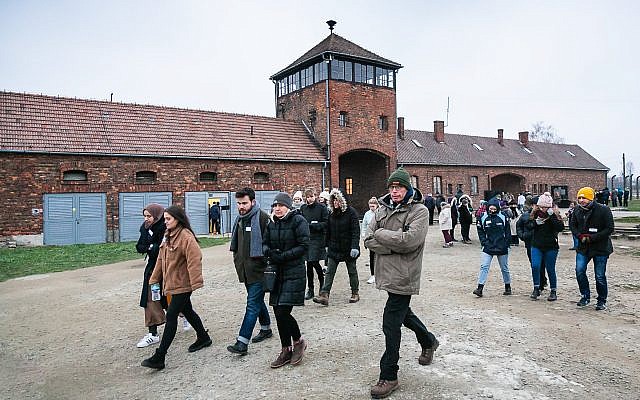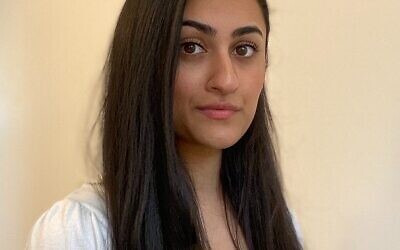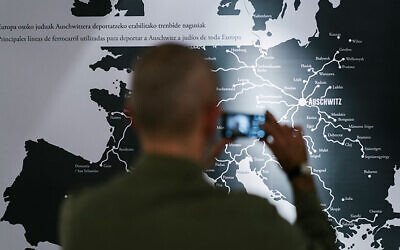OPINION: How to define the future of Holocaust education and commemoration?
Jaya Pathak, a regional ambassador for the Holocaust Educational Trust, asks: if Nazi crimes cannot prevent future genocides, can we really say that we have seen Auschwitz at all?

“If we remain blind to unfolding atrocities, if the international community does not become more effective in preventing genocide, can we really say that we have ‘seen’ Auschwitz at all?”
This sentence is found at the closing of the ‘Seeing Auschwitz’ exhibition in London. Since my visit, I have been unable to shake the feeling that the answer, as difficult as it is to accept, may in fact be no.
Hearing from a Holocaust survivor has a momentous impact on one’s life in both their ability to learn about the Holocaust, and to comprehend the tragedy that can occur when hatred is left unchecked.

Listening to survivor testimony helps us develop a human connection to horrors which appear, on the surface, to be confined to another century. Holocaust survivors bridge the seemingly long distance between our past, present and future by reminding us that the lessons of the Holocaust remain relevant today.
However, last week as beloved Holocaust survivor Zigi Shipper BEM passed away, we were brought closer to confronting a difficult reality about a future many of us have been dreading – where survivors are passing away or are increasingly unable to continue to share their testimony.
How we manage this transition will not only define the future of Holocaust education, remembrance and commemoration, but our potential to challenge the proliferation of modern atrocity on a broader scale. By harnessing the power of technology, we can explore the use of virtual reality to personalise history for individuals by allowing them to ask their own questions to survivors.
Second and third-generation Holocaust survivors and family members who wish to share their family’s history must be supported adequately, and others who have heard from survivors such as Holocaust Educational Trust Ambassadors must be empowered to share the stories they have been entrusted with.

Visiting the many different sites of the Holocaust is another powerful tool used by educators to allow individuals to bring the past into their present. Ensuring that we continue to protect these sites, whether that be concentration camps or locations of Jewish history in towns and cities, must remain a priority.
Additionally, Holocaust memorialisation allows an opportunity for reflection and to commemorate the lives behind the statistics. Building such sites widens the accessibility of Holocaust education and remembrance, and it is welcomed news that the UK Government will legislate to build the Holocaust Memorial and Learning Centre in the heart of our democracy.
From Cambodia, Rwanda, Bosnia and Darfur, to the Yazidis and the Uyghurs, our leaders have failed community after community
Finally, on a local, national and international level, we must continue to build interfaith unity and work with diverse communities across our society by providing them with meaningful opportunities to engage in Holocaust education.
As with sharing their testimony, Holocaust survivors make the selfless decision to relive their trauma in order to speak out against all forms of hatred, including for other victims of genocide. Yet we only have to look around us to see that their pleas have been ignored.
From Cambodia, Rwanda, Bosnia and Darfur, to the Yazidis and the Uyghurs, our leaders have failed community after community around the globe who continue to suffer immeasurably in the face of their eradication.
This is when it is most important to remember that the history of the Holocaust is not just the history of European Jewry, but it is our shared history, and to have truly understood the lessons of the Holocaust, we must also reassess our approach to atrocity prevention on a local and governmental level.
Holocaust education is about more than learning historical facts. It is about providing one with the tools to protect the history of the Holocaust, to challenge antisemitism and all other forms of hatred. Therefore, the future of Holocaust education should not only be about what meets the eye, but our ability to reflect on its meaning. It should centre around our motivation to not simply hear the words of a Holocaust survivor, but to become their messengers.
Perhaps then, we will be able to say that we have truly ‘seen’ Auschwitz, as we do all we can to make meaning of the promise we have made to survivors – of ‘never again’.
- Jaya Pathak is co-executive director at Yet Again, Secretariat for the APPG on Uyghurs, co-chair at Students For Uyghurs and a regional ambassador at the Holocaust Educational Trust

Thank you for helping to make Jewish News the leading source of news and opinion for the UK Jewish community. Today we're asking for your invaluable help to continue putting our community first in everything we do.
For as little as £5 a month you can help sustain the vital work we do in celebrating and standing up for Jewish life in Britain.
Jewish News holds our community together and keeps us connected. Like a synagogue, it’s where people turn to feel part of something bigger. It also proudly shows the rest of Britain the vibrancy and rich culture of modern Jewish life.
You can make a quick and easy one-off or monthly contribution of £5, £10, £20 or any other sum you’re comfortable with.
100% of your donation will help us continue celebrating our community, in all its dynamic diversity...
Engaging
Being a community platform means so much more than producing a newspaper and website. One of our proudest roles is media partnering with our invaluable charities to amplify the outstanding work they do to help us all.
Celebrating
There’s no shortage of oys in the world but Jewish News takes every opportunity to celebrate the joys too, through projects like Night of Heroes, 40 Under 40 and other compelling countdowns that make the community kvell with pride.
Pioneering
In the first collaboration between media outlets from different faiths, Jewish News worked with British Muslim TV and Church Times to produce a list of young activists leading the way on interfaith understanding.
Campaigning
Royal Mail issued a stamp honouring Holocaust hero Sir Nicholas Winton after a Jewish News campaign attracted more than 100,000 backers. Jewish Newsalso produces special editions of the paper highlighting pressing issues including mental health and Holocaust remembrance.
Easy access
In an age when news is readily accessible, Jewish News provides high-quality content free online and offline, removing any financial barriers to connecting people.
Voice of our community to wider society
The Jewish News team regularly appears on TV, radio and on the pages of the national press to comment on stories about the Jewish community. Easy access to the paper on the streets of London also means Jewish News provides an invaluable window into the community for the country at large.
We hope you agree all this is worth preserving.





















